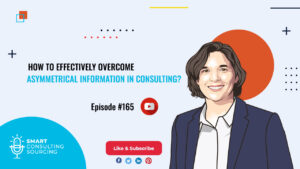Hello and welcome back to Smart Consulting Sourcing.
I am Hélène and today we will be talking about how not to fail on a consulting project. But before that, let me give you a recap about last week’s podcast.
I talked about how to negotiate at the last moment on consulting projects. Be sure to have an NDA ready before you head further into the negotiation process.
The key cost drivers for any consulting project are the scope, the cast, and the discount! But in order to get the most out of the negotiation, you’ll need to use some matrix of your own. Seek help from the BATNA & ZOPA
Listen to the full podcast here.
However, this week, I wanna talk about how to surely fail on a consulting project!
What is the secret of a failsafe consulting project?
To know that, you need to know how you can ruin your project. Let’s learn it in a fun way. This podcast is all about politely making people realize what they did wrong by deliberately speaking of wrong turns and bad decisions. We got a term for that in French, “Démonstration par l’absurde” (reductio ad absurdum).
Be vague and Unrealistic about everything – goals, expectations, RFPs and all
So, let’s get started. The first step to ruin your consulting project is to make sure that the needs are vague or unclear.
Consultants brag they are the best and brightest professionals. Let’s put them to the test. Setting unrealistic expectations is the cornerstone of a failed consulting project. If you are really sneaky, define objectives that look realistic, but are not in reality.
The consultants won’t be able to deliver but they will blame themselves! That’s always better than blaming yourself, right?
Doesn’t this contradict what I wrote in one of my previous podcasts about core competencies and sourcing capability? Yes, it does! Thank goodness we can learn from failure then. We all love surprises on our invoices, don’t we?
Another huge mistake that some inexperienced companies do is defining exactly what results they expect, and under which form. If you really want to get the consultants lost and generate frustration on both sides, don’t include deliverables in your RFP. And if you are really a gambler, don’t include them in the contract either.
Remember, expectations are everything. If you don’t know what the consulting firm is doing on your behalf, how will they? If you give them a vision of where to go or deliverables that make sense for your company, then consulting project success would be assured!
Keep stakeholders at bay and don’t bother about project goals
One more great way to make sure the consulting project is going nowhere is to make sure the main stakeholders are not identified nor involved.
The worse that could happen is for you to build a consensus over the objectives of the project, and to have the main stakeholders embrace the project. Think to not inform your teams about the purpose of the project and how it will unfold. Worst-case scenario, you will probably be able to delay the project
Forget long process of consulting sourcing and hire just any firm. Save your energy.
You surely would not want to work with the right consultants as well. A consulting project is doomed to succeed if you are working with consultants that have the right skills and experience. They will probably help you solve your needs the right way… or worse deliver them on time.
And this happens quite often, sadly. Here is what we said about finding the right consultant in one of our previous podcasts. But you can ignore us.
Don’t listen to the naysayers that tell you to assess the fit with a Consultant before hiring them. You can choose the Consulting Firm with the best name or the fanciest office. Don’t listen to the Consultants and don’t ask yourself if you could work with them. Even better, choose them on paper only or grade the proposal with a set of 6-face dice.
Hell, don’t even establish a profile. Just go by instincts. Consultants are clones. They look the same, they have the same background, the same experience field. They have worked on the same projects, in the same industry.
Why should you care about working with right guys? They all are the right guys. Or are they? Let’s take the last one you worked with. Not the same expertise required? Who cares.
Even make sure there’s no Plan B!
During the sourcing phase, be dismissive of the second-runners. Be the bad guy. An angry consulting firm will most probably refuse to take on a project if the first attempt has failed.
Now coming to the management part of screwing up the project and oh boy we’ve got ourselves a treat of such examples.
The life of a project will be sprinkled with twists and turns. Embrace the changes in scope whether they come from your teams or the consultants. Never ask about the potential on the workload and the price before you make your decisions. Everybody loves to have a surprise when receiving an invoice.
Bring too many cooks to spoil the broth AKA your consulting project
If you have been around a bit, you know that the worst thing that can happen to a project is to have several persons in charge. You don’t want the project to deliver in time and quality? Forget about the governance. Who needs a Steering Committee today? Besides, defining roles and responsibilities might actually help the consulting team to identify who to talk to. Don’t do that.
And you might think: “My house, my rules”. But you got it wrong. If you take control of the project and manage the consultants, your project has a fair chance to succeed. Is it really what you want? Why not let the consultants take over? They will make sure that the project follows their agenda.
Don’t involve the senior management in the project
Another key failure factor for a project is the lack of commitment of senior executives. If they support fully the project, you are doomed: your project has very high chances to go through and be successful. When senior management is committed to a project, your teams tend to welcome the consultants and work closely with them. This is so wrong.
Withhold information from the consultants
Working openly with consultants is a sure way to give them all the levers to succeed in delivering high-quality work. Forbid your teams to cooperate with the consulting teams. Threaten and punish if necessary. You cannot afford to give the consultants the information they need to achieve your goals.
The last thing you want when consulting firms are working with management teams is an open dialogue about their needs and direction. No one likes surprises in consulting projects but this really takes it too far doesn’t it?
Why not get rid of all consultant feedback right from the start by simply asking them if they have any questions before every meeting/presentation instead of letting them provide some valuable insight into improving results?
And a little bonus tip is to always bring your hidden agenda to the project.
This solution is best for Executives with a plan. If you really want a project to fail, you can pretend to agree with the objectives and the choice of consultants, and then do everything to make sure you choose the consultants that will push your agenda, and not necessarily deliver on the expectations of the rest of the team.
In conclusion,
Don’t do any of these things. When it comes to finding a consulting firm, you really need to know what your needs are. Are you looking for help with developing strategies or executing them? Do you want someone that can provide hands-on assistance as well as handle the day-to-day management of your project? If so, make sure you find a consultant who has experience in those areas and is qualified for the type of work required. It’s also important to manage your project from day one by establishing clear expectations and deadlines; this will save both time and money which often leads to more success!
And that marks the end of our podcast, folks. Next week, I want to talk about internal consulting. So, stay tuned.
Till then, stay safe and happy sourcing!
If you have other questions about how to generate more value when working with consultants, remember you can contact me directly on LinkedIn or by email because I am always game for a chat!
Bye and see you next week! Au revoir!







